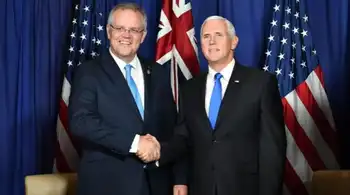Ontario to ease energy cost hikes
- Energy bills are probably going up, says Ontario Energy Minister Dwight Duncan. That's the bad news.
The good news: New rules introduced by Queen's Park for the electricity market should make the price swings less violent.
Using Ontario's traditional, low-cost generators such as the big hydro-electric station at Niagara Falls to moderate price hikes, and controlling wild price swings through careful regulation, will make the new prices easier to swallow, Duncan told a legislative committee recently.
But he warned that Ontario residents and businesses must pay the true cost of energy to attract the investment needed to replace Ontario's rapidly aging fleet of generators.
And energy costs are rising on all fronts.
"World energy markets are very unstable; that should be a concern to all Ontarians," Duncan said after making a presentation on the new Electricity Restructuring Act.
Although the focus of the bill is the province's electricity system, Duncan said all energy sectors are turbulent. "I can't protect Ontario consumers from Iraq," he said.
Opposition critics said that Duncan's plans would only mean more pain for consumers, however. "I think consumers should be prepared for higher prices and more uncertainty," said Conservative MPP John O'Toole (Durham).
Duncan said the new bill tries to smooth the natural turmoil in the electricity market, which interacts with prices from other energy sectors. "What I can say is we can produce an electricity regime that is the by-product of many of these things that will afford small consumers predictable rates and more stable rates than they've seen."
The new bill sets up the Ontario Power Authority, which will be charged with drawing up a long-term electricity plan for the province and ensuring that an adequate supply of power is on hand to fill the projected demand.
The Ontario Energy Board will devise a new formula for setting consumer prices, blending the price from low-cost generators such as the traditional hydro stations that produce power for less than 2 cents a kilowatt-hour with the prices for higher-cost generators, such as natural gas-fired plants that require prices of 8 cents a kilowatt-hour or more to cover their costs, depending on the volatile price of natural gas.
The province is also committed to widespread installation of "smart meters" that can reward consumers by charging them lower prices for power during off-peak hours and hit them with high prices during peak demand periods when the system is under strain.
Supply is a big issue because the Liberals have promised to shut down Ontario's coal-fired generators by 2007, although they've hedged by saying they won't risk security of supply.
Recently, New Democratic Party Leader Howard Hampton accused Duncan of abandoning that promise. He noted the province has started a bidding process for private firms interested in replacing up to one-third of the capacity of the coal-fired plants.
But the terms of the request for proposals state the new generators may come into service as late as 2009, two years after the promised coal shutdown, Hampton said.
"You're operating on a hope and a prayer," Hampton told Duncan. Duncan said the new generators could be in service as early as 2006 under the terms of the government's rules, and "most" will be ready by 2007.
Hampton also attacked the Liberals for breaking an election promise by raising the consumer price of electricity from 4.3 cents a kilowatt-hour for the energy portion, which makes up about half of the total bill. Consumers pay 4.7 cents for the first 750 kilowatt-hours they use each month, and 5.5 cents a kilowatt-hour for anything beyond that.
Hampton also predicted consumer prices would rise because of the government's invitation to more private-sector firms to build generators.
Duncan acknowledged that the Liberals made a mistake by promising to maintain the 4.3 cent price freeze. But he said Ontario Power Generation's heritage assets, such as the hydroelectric stations that produce power for less than 2 cents a kilowatt hour, will be used as a counterweight to more expensive energy sources.
The Ontario Energy Board has been ordered to devise a formula for blending the various components of energy pricing into a stable consumer price by April 30, 2005.
Duncan noted the province is also asking for proposals to produce power from green and renewable sources. Duncan said new conservation measures will be introduced this fall.
Protesters from Greenpeace stood outside the Legislature calling for the province to clarify its stand on the future of nuclear power.
The way the act is written, nuclear power could be considered an alternative or green energy form, said Greenpeace spokesperson Dave Martin. Duncan said nuclear's status will be clarified this fall.
Related News

NEW Hydro One shares down after Ontario government says CEO, board out
TORONTO - Hydro One Ltd. shares slid Thursday with some analysts sounding warnings of greater uncertainty after the new Ontario government announced the retirement of the electrical utility's chief executive and the replacement of its board of directors.
After sagging by almost eight per cent in early trading on the Toronto Stock Exchange, shares of the company were later down four per cent, or 81 cents, at $19.36 as of 11:42 a.m. ET.
On Wednesday, after stock markets had closed for the day, Ontario Premier Doug Ford announced the immediate retirement of Hydro One CEO Mayo Schmidt. He leaves with a $400,000…




